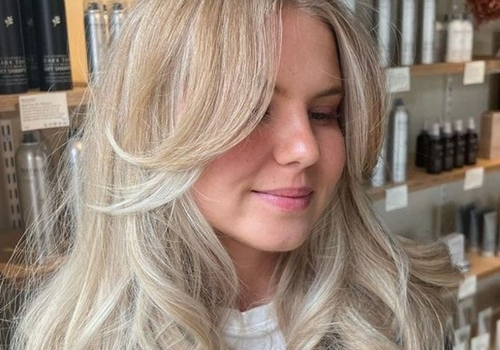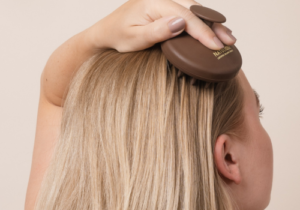A sensitive scalp can cause discomfort, itching and even pain. Understanding the causes is crucial to effectively treating this condition. In this article, we'll explore the different causes of scalp sensitivity and suggest natural methods to soothe these symptoms.
Understanding the causes of scalp sensitivity
Internal causes
Internal health problems
Internal health problems, such as hormonal imbalances, can directly affect scalp health. For example, hypo- or hyperthyroidism can lead to increased sensitivity. An imbalance in sebum production can also make the scalp more sensitive and prone to irritation.
Stress and anxiety
Stress and anxiety have a considerable impact on scalp sensitivity. Chronic stress can increase the production of cortisol, a hormone that can lead to inflammation and make the scalp more reactive and sensitive.
External causes
Weather changes
Changes in temperature and humidity can affect scalp sensitivity. The dry cold of winter can dry out the scalp, leading to itching and irritation. Conversely, prolonged exposure to the sun and high temperatures can also cause increased sensitivity.
Reactions to hair care products
Hair products containing perfumes, dyes and preservatives can irritate the scalp. Aggressive hair care routines, such as frequent use of shampoos, bleaches or perms, can also cause negative reactions.
Natural techniques to soothe a sensitive scalp
Use of essential oil treatments
Tea tree oil for its anti-inflammatory properties
Tea tree oil is known for its anti-inflammatory and antifungal properties. It can be particularly useful for soothing itchy, irritated scalps. To use this oil, dilute a few drops in a carrier oil such as coconut or olive oil, then gently massage into your scalp. Leave for 15-20 minutes before rinsing and washing your hair.
Lavender oil for its calming effect
Lavender essential oil is famous for its soothing and calming properties. It can help reduce stress and anxiety, which are often responsible for scalp sensitivity. Mix a few drops of lavender oil with a carrier oil and gently massage it into your scalp. This routine can be repeated once or twice a week for optimum results.
Nourishing masks using kitchen ingredients
Avocado and honey mask
Avocados are rich in vitamins and essential fatty acids, making them particularly beneficial for scalp health. Honey, meanwhile, has antimicrobial and moisturizing properties. To prepare this mask, mash a ripe avocado and mix with two tablespoons of honey. Apply this mixture to your scalp and hair, paying particular attention to sensitive areas. Leave on for 30 minutes before rinsing thoroughly and washing your hair with a mild shampoo.
Mask with aloe vera and coconut oil
Aloe vera is known for its moisturizing and soothing properties, while coconut oil deeply nourishes the scalp. For this mask, mix two tablespoons of aloe vera gel with one tablespoon of coconut oil. Apply the mixture to your scalp and leave for 20-30 minutes. Rinse thoroughly and wash your hair for a soothed, moisturized scalp.
See also: How can I treat my hair naturally?
Foods to strengthen the health of your scalp
Omega-3-rich foods
Oily fish
Oily fish such as salmon, mackerel and sardines are excellent sources of omega-3s, essential fatty acids that play a crucial role in the health of your scalp. Omega-3s improve blood circulation and nourish hair follicles, reducing inflammation and irritation. By including these fish in your regular diet, you can contribute to a healthier, less sensitive scalp.
Flax seeds
Flaxseeds are another excellent source of omega-3s, especially for those following a vegetarian or vegan diet. You can easily incorporate flaxseeds into your diet by adding them to smoothies, salads or cereals. They're also a good source of fiber, which helps maintain healthy skin and scalp by promoting proper digestion and better absorption of nutrients.
Vitamin-rich foods
Vitamin A
Vitamin A plays an important role in the production of sebum, a natural substance that moisturizes the scalp. Carrots, sweet potatoes and spinach are excellent sources of this vitamin. Adequate vitamin A intake can help prevent dryness and irritation of the scalp, helping to reduce sensitivity.
Vitamin E
Vitamin E is a powerful antioxidant that helps protect scalp cells from free radical damage. Nuts, seeds and green leafy vegetables are rich in vitamin E. By regularly consuming these foods, you can improve blood circulation to the scalp, promoting better hair health and reducing inflammation.
Vitamin D
Vitamin D is essential for hair growth and scalp health. A lack of this vitamin can lead to hair loss and a sensitive scalp. Dietary sources of vitamin D include oily fish, eggs and mushrooms. Moderate exposure to the sun can also help your body produce enough vitamin D.
Vitamin C
Vitamin C plays a crucial role in the production of collagen, an important protein for healthy skin and scalp. Citrus fruits, berries and peppers are excellent sources of vitamin C. In addition to strengthening the scalp, this vitamin also improves the absorption of iron, a mineral necessary for hair growth.
Vitamin B
B vitamins, notably biotin (B7) and niacin (B3), are crucial to hair health. Biotin is often recommended to prevent hair loss and improve hair texture. Dietary sources include eggs, nuts and legumes. Niacin improves blood circulation to the scalp, helping to nourish hair follicles. Chicken, fish and whole grains are excellent sources of niacin.
Proper hydration
Hydration is crucial for a healthy scalp. Insufficient water intake can lead to a dry, irritated scalp. By drinking enough water every day, you can help maintain the water balance of your body and scalp. In addition to water, herbal teas and fresh fruit juices can also help keep you hydrated.
Zinc-rich foods
Zinc is an essential mineral for healthy hair. It aids tissue repair and ensures the proper functioning of the sebaceous glands surrounding hair follicles. Zinc deficiency can lead to scalp problems and hair loss. Dietary sources rich in zinc include oysters
Change your hair routine to soothe a sensitive scalp
Choose natural, gentle products
Sulfate-free shampoos
Sulfates are powerful cleansing agents that can be harsh on a sensitive scalp. Choosing sulfate-free shampoos cleanses your hair while respecting the natural balance of your scalp. Look for ingredients like aloe vera, chamomile or lavender, renowned for their soothing properties.
Moisturizing conditioners
A gentle, moisturizing conditioner can help soothe the scalp and hydrate the hair. Opt for products based on shea butter, argan oil or almond milk to deeply nourish your scalp without causing irritation.
Adapted washing routines
Limit washing frequency
Washing your hair too frequently can strip the scalp of its natural oils, drying it out and increasing its sensitivity. We recommend limiting washing to two or three times a week to allow your scalp to regain its natural balance.
Use lukewarm water
The temperature of the water used to wash your hair plays an important role in the health of your scalp. Very hot water can irritate and dry the skin, while cold water may not be as effective at removing product residues. Use lukewarm water for effective cleansing without stressing your scalp.
Regular natural masks and treatments
Yogurt and honey mask
Yogurt and honey are natural ingredients with moisturizing and soothing properties. Mix half a cup of plain yoghurt with a tablespoon of honey and apply this mask to your scalp. Leave on for 20 minutes before rinsing off with lukewarm water to nourish and soothe your sensitive scalp.
Apple cider vinegar rinse
Apple cider vinegar is renowned for its pH benefits, helping to balance that of the scalp. Dilute two tablespoons of apple cider vinegar in a cup of water and use as a final rinse after shampooing. This can help reduce itching and irritation.
Herbal scalp care
Chamomile infusion
Chamomile is a plant with anti-inflammatory and soothing properties. Make a chamomile infusion by boiling water with chamomile flowers. Leave to cool and use this infusion to rinse your hair after shampooing. This natural treatment can help soothe scalp irritation and inflammation.
Fenugreek gel
Fenugreek has moisturizing and soothing properties for the scalp. Soak fenugreek seeds in water overnight, then grind to a paste. Apply this gel to your scalp and leave for 30 minutes before rinsing. This treatment can help reduce itching and deeply moisturize.
Taking care of your health
Reduce stress
Stress is one of the main causes of scalp sensitivity. Incorporate stress management techniques such as meditation, yoga or breathing exercises into your daily routine. A calmer mind will help reduce scalp sensitivity.
Maintaining good hygiene
Hygiene is crucial to prevent scalp irritation. Use a clean comb or brush regularly to avoid the build-up of dirt and hair products.





